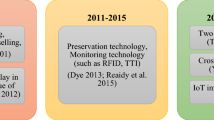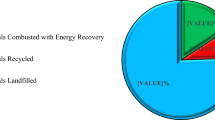Abstract
Many supply chains use returnable packaging such as plastic and metal containers, folding boxes, racks, and trays to transport components from suppliers to buyers. This study investigates the scheduling problem of a supplier that produces jobs for several buyers where the jobs for each buyer have to be delivered in that buyer’s returnable containers. Empty containers are provided by the buyers at certain release dates. The supplier can process a job when no adequate empty containers are available, but then incurs extra handling costs to pack the job into auxiliary packaging and repack it later. This study extends single machine scheduling with weighted earliness and tardiness penalties and batching by including returnable containers and repacking penalties. A mathematical programming formulation and a two-stage heuristic for this previously unstudied NP-hard scheduling problem are proposed and evaluated in a numerical study.







Similar content being viewed by others
References
Allahverdi, A., Gupta, J. N. D., & Aldowaisan, T. (1999). A review of scheduling research involving setup considerations. Omega, 27(2), 219–239.
Allahverdi, A., Ng, C., Cheng, T., & Kovalyov, M. Y. (2008). A survey of scheduling problems with setup times or costs. European Journal of Operational Research, 187(3), 985–1032.
Arkin, E.M., & Roundy, R.O. (1988). A pseudo-polynomial time algorithm for weighted tardiness scheduling with proportional weights Technical Report No. 812, College of Engineering, Cornell University.
Azizoglu, M., & Webster, S. (1997). Scheduling job families about an unrestricted common due date on a single machine. International Journal of Production Research, 35(5), 1321–1330.
Baker, K. R. (1999). Heuristic procedures for scheduling job families with setups and due dates. Naval Research Logistics, 46(8), 978–991.
Baker, K. R., & Scudder, G. D. (1990). Sequencing with earliness and tardiness penalties: A review. Operations Research, 38(1), 22–36.
Buxey, G. (1989). Production scheduling: Practice and theory. European Journal of Operational Research, 39(1), 17–31.
Chrysler, L.L.C. (2009). Packaging and shipping instructions. https://cda.extra.chrysler.com/icon/mpe/files/ChryslerPckgShpgInstr3_09_2_. Accessed 13 January 2013.
Coia, A. (2013). Gleaming the cube. Automotive Logistics, 16(1), 36–40.
Coia, A. (2014). Getting to the point of return. http://www.automotivelogisticsmagazine.com/intelligence/getting-to-the-point-of-return. Accessed 7 March 2014.
Del Castillo, E., & Cochran, J. K. (1996). Optimal short horizon distribution operations in reusable container systems. Journal of the Operational Research Society, 47(1), 48–60.
Garey, M. R., & Johnson, (1979). Computers and intractability—A guide to the theory of NP-completeness. New York: Freeman.
Garey, M. R., Tarjan, R. E., & Wilfong, G. T. (1988). One-processor scheduling with symmetric earliness and tardiness penalties. Mathematics of Operations Research, 13(2), 330–348.
Hofmann, E., & Bachmann, H. (2006). Behälter-Management in der Praxis. Hamburg: Deutscher Verkehrs-Verlag. (in German).
Kärkkäinen, M., Ala-Risku, T., & Herold, M. (2004). Managing the rotation of reusable transport packaging—A multiple case study. In Thirteenth International Working Seminar on Production Economics.
Kroon, L., & Vrijens, G. (1995). Returnable containers: An example of reverse logistics. International Journal of Physical Distribution & Logistics, 25(2), 56–68.
Lackner, E., & Zsifkovits, H. (2006). Die Rolle von Behältern in der supply chain. (in German) In C. Engelhardt-Nowitzki (Ed.), Chargenverfolgung: Möglichkeiten, Grenzen und Anwendungsgebiete (pp. 241–256). chap. Die Rolle von Behältern in der Supply: Springer.
Potts, C. N., & Kovalyov, M. Y. (2000). Scheduling with batching: A review. European Journal of Operational Research, 120(2), 228–249.
Robert Bosch GmbH (2007). Supplier logistics manual, release 3.0.http://purchasing.bosch.com/download/LHL_V_3_0_en. Accessed 30 December 2012.
Schaller, J. (2007). Scheduling on a single machine with family setups to minimize total tardiness. International Journal of Production Economics, 105(2), 329–344.
Schaller, J. E., & Gupta, J. N. (2008). Single machine scheduling with family setups to minimize total earliness and tardiness. European Journal of Operational Research, 187(3), 1050–1068.
Schmölzer, T., & Schöfer, J. (2005). Bedarfsorientiertes Behältermanagement zur Kostenreduzierung in der Automobilindustrie.Zeitschrift für die gesamte Wertschöpfungskette Automobilwirtschaft, 56–60.
Sourd, F. (2005). Earliness-tardiness scheduling with setup considerations. Computers & Operations Research, 32(7), 1849–1865.
Sourd, F. (2006). Dynasearch for the earliness-tardiness scheduling problem with release dates and setup constraints. Operations Research Letters, 34(5), 591–598.
Sourd, F., & Kedad-Sidhoum, S. (2008). A faster branch-and-bound algorithm for the earliness-tardiness scheduling problem. Journal of Scheduling, 11(1), 49–58.
Wan, G., & Yen, B. P. C. (2002). Tabu search for single machine scheduling with distinct due windows and weighted earliness/tardiness penalties. European Journal of Operational Research, 142(2), 271–281.
Yates, C., & Wyant, S. (2012). Navistar engine group supplier guidelines February 2012. http://www.navistarsupplier.com/Documents/DO000D01. Accessed 13 January 2013.
Yildiz, H., Ravi, R., & Fairey, W. (2010). Integrated optimization of customer and supplier logistics at Robert Bosch LLC. European Journal of Operational Research, 207(1), 456–464.
Author information
Authors and Affiliations
Corresponding author
Rights and permissions
About this article
Cite this article
Mensendiek, A. Scheduling with returnable containers. J Sched 18, 593–605 (2015). https://doi.org/10.1007/s10951-015-0426-0
Published:
Issue Date:
DOI: https://doi.org/10.1007/s10951-015-0426-0




